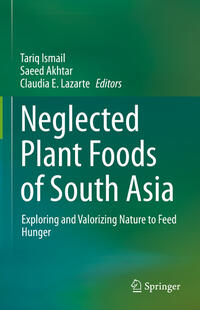
According to the global hunger index, South Asia has worldwide highest rate of undernourished people. Such a burden of food insecurity and various forms of malnutrition are directly associated with the existing food production system that ignores biodiversity, food affordability, and sustainability. During the last five decades, food production system has witnessed a global shift from ethnic to mainstream staple cereals production and promotion. Such an approach has badly affected the regional genetic pool of a diverse range of nourishing, economical, and sustainable edible plant species which are now referred to as neglected or underutilized food crops.   Neglected Plant Foods of South Asia collects and preserves existing knowledge of underutilized, minor, wild, neglected and traditional food plants of South Asia, and their utilization for the production of value-added food products. Aiming at introducing plant – based food solutions to address the increasing burden of food insecurity among marginalized communities of South Asia, this manuscript covers a plethora of nutrient-dense plant species including fruits, vegetables, roots, tubers, cereals, pseudo-cereals, and pulses. In addition to having an overview of each plant's origin, cultivation practices and production statistics, researchers will find comprehensive information on nutritional composition, food manufacturing properties, value-addition and traditional uses of neglected plant foods. Recent updates on strategies to combat toxicological risks associated with the consumption of neglected food plants have also been included. With this volume, researchers will have complete information on neglected, underutilized traditional edible plants of South Asia, and their potential to increase food security under the emerging challenges of climate change.